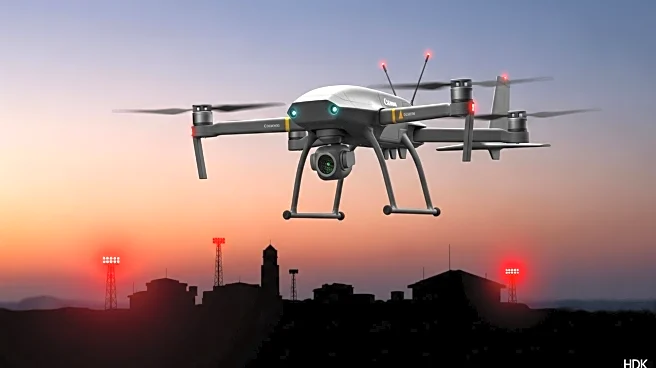What's Happening?
Danish authorities are investigating a series of drone sightings over military sites, including the Karup military base, Denmark's largest. The incidents, described as a 'hybrid attack,' have raised security concerns, with officials hinting at possible Russian involvement. The drones were observed around 8:15 PM local time, prompting a temporary closure of civil airspace. Despite the suspicions, there is no confirmed evidence linking Russia to the incidents, and the Russian embassy in Copenhagen has denied any involvement, calling the events a 'staged provocation.' The drone flights began shortly after Denmark announced plans to acquire long-range precision weapons, citing Russia as a long-term threat.
Why It's Important?
The drone incursions have significant implications for European security, highlighting vulnerabilities in airspace defense and the potential for unconventional warfare tactics. Denmark's response, including the acquisition of anti-drone technology from Sweden, underscores the urgency of addressing these threats. The incidents have also prompted discussions among EU defense ministers about creating a 'drone wall' to protect against similar attacks. The situation reflects broader geopolitical tensions, particularly in light of Russia's ongoing military activities in Ukraine, and could influence future defense policies and international relations within the region.
What's Next?
Denmark is set to host an EU summit, where anti-drone measures will be a priority. The country has accepted Sweden's offer of anti-drone technology to ensure the summit proceeds without disruption. Investigations into the drone sightings continue, with authorities seeking to identify those responsible. The EU's focus on building anti-drone defenses may lead to increased collaboration and resource allocation for security measures across member states. The situation may also prompt further diplomatic engagements to address the underlying tensions and prevent escalation.
Beyond the Headlines
The drone incidents highlight the evolving nature of warfare, where technology plays a crucial role in security and defense strategies. The use of drones for surveillance or potential attacks raises ethical and legal questions about airspace sovereignty and the rules of engagement. As countries invest in anti-drone technologies, there may be long-term shifts in military spending and strategic priorities, influencing global defense markets and innovation in security technologies.









